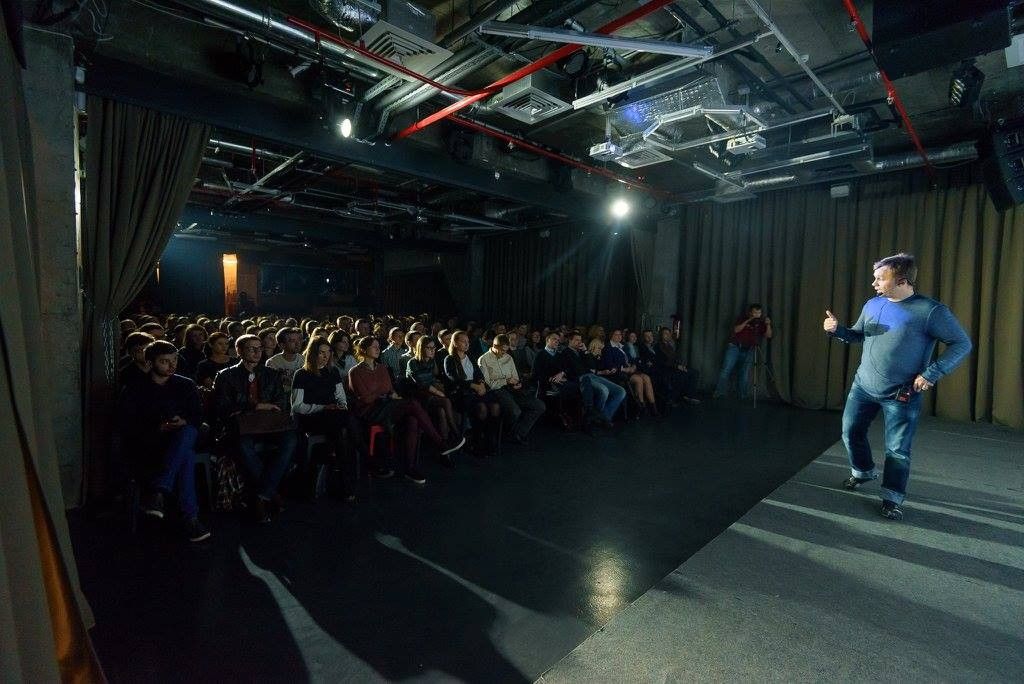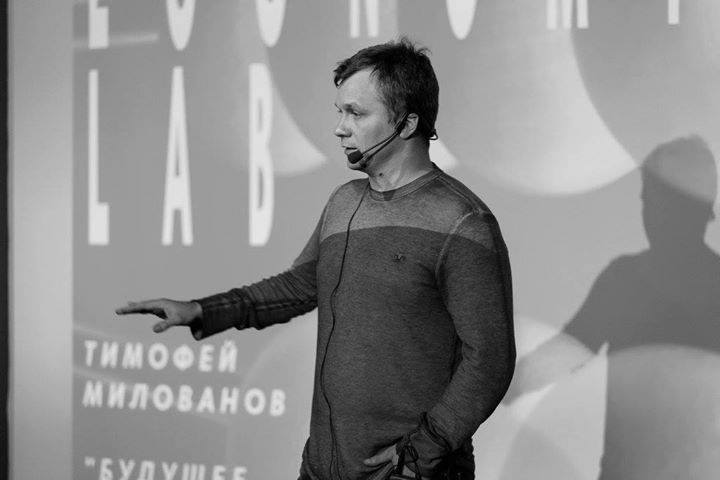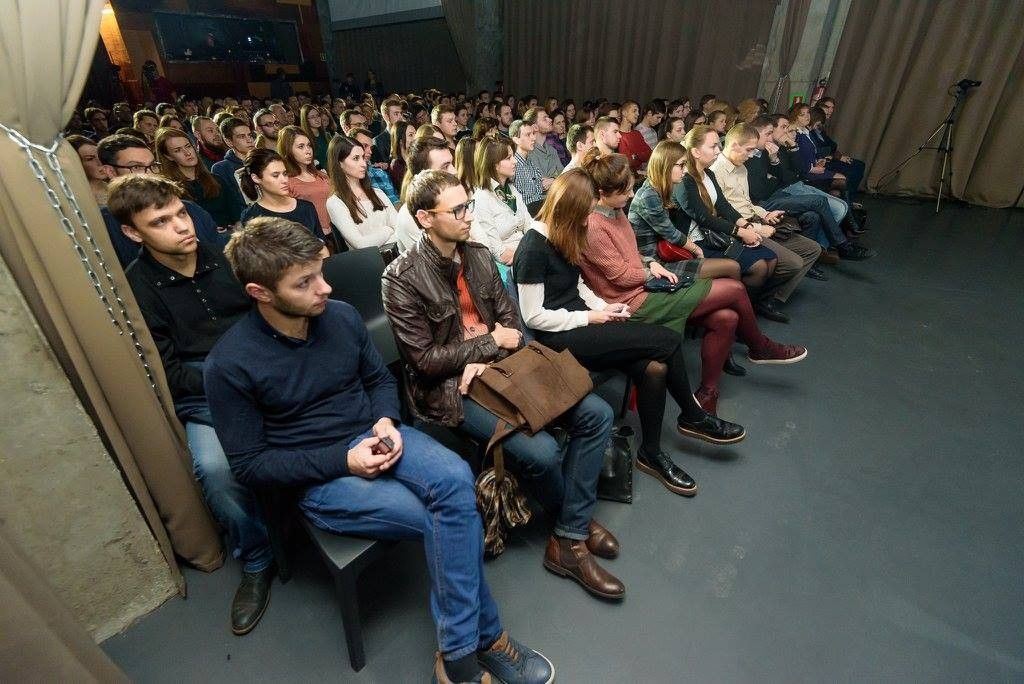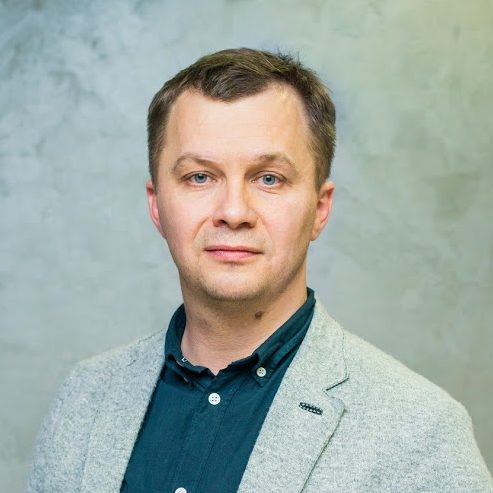Ukraine’s biggest problem is that after 23 years people here still don’t understand why they need education, or how they can monetize it into a good and quality life. Now we see lots of smart people who graduate from the leading Ukrainian universities and don’t want to continue their studies for two reasons: they either don’t have the opportunity or the understanding why. They need to earn a $500 salary right now, and they are not ready to spend another year or two to get a better education.
On 29 October, Timofey Milovanov, professor of economics at the University of Pittsburgh and co-founder of VoxUkraine, delivered a lecture on The Future of Education in FEDORIV Hub. Milovanov told the audience what’s going on in the western education system, what are the differences between good and the bad higher educational institutions, what to study now in order to have sustainable employment, and how Ukrainian universities can compete with the best Western higher educational institutions.
The lecture was held in a free format without a presentation, with vivid examples and interesting questions. LІGA.net prepared a brief summary of this speech.
Key Problem: Why Study?
In Washington, the majority of people making influential state decisions are alumni of a particular group of educational institutions. First of all, these are the Ivy League universities (Yale, Harvard, Columbia, and five more higher education institutions — Ed. note). There are also some alumni of other higher educational institutions, but the ranking is very strict: if you want to work at an influential government body, you need to study at one the 10-20 top universities.
In the 1990s, I worked at an investment bank in Kyiv, and I earned a good salary by Ukrainian standards. Back then I didn’t really understand why I had chosen to study at the ERC programme (then the Kyiv-Mohyla Academy, now the Kyiv School of Economics), where the scholarship was 15 times lower. I couldn’t find the answer to the question why I should sit in on lectures and study all those boring things, what it would bring to me. Today I know that the main purpose of the right education is to bring you closer to a high degree of freedom in life.

Now I am a professor at Pittsburgh University, and I have a high salary, which is guaranteed for 25 years. I have savings accumulated in securities; I’ll be able to live off them when I retire. I don’t depend on state pension funds or grants. It gives me freedom — both intellectual and physical. To come to this state of affairs, I had to work hard and diligently. When I lived in Ukraine, I didn’t see all this and I didn’t understand where and why I should go.
Ukraine’s biggest problem is that after 23 years people here still don’t understand why they need education, or how they can monetize it into a good and quality life. Now we see lots of smart people who graduate from the leading Ukrainian universities and don’t want to continue their studies for two reasons: they either don’t have the opportunity or the understanding why. They need to earn a $500 salary right now, and they are not ready to spend another year or two to get a better education. It is necessary to understand that $500 is absolutely nothing in terms of your long-term mathematical expectation of income if you get a quality education. You’ll have a degree of freedom when you don’t count the money on your account. This situation is what economists call market failure.
Let me explain this by giving you an example. Imagine that I have a used car I’ve been driving for 10 years, and I want to sell it. Maybe I treated it well, garaged it, cared for it, and never got into an accident. Another option is that I’m a young guy and I wrecked my car in just a couple of years, driving at high speed, and getting into several accidents which I didn’t register in the car’s history. I thoroughly detail my car and I offer it for sale in the market. Now let’s look at all this from a buyer’s point of view. I buy a nice detailed car, but I don’t know for sure whether it is good or clapped out, and I will have a lot of problems with it. For a car in good condition the buyer is willing to pay $10,000, for a clapped out car — $1,000. Thus, the average price I’m willing to pay is $5,500 or less if I don’t like taking risks. From the standpoint of the first seller of the car: am I ready to sell my car, for which I’ve cared for so many years, for $5,500? No. That’s why I simply won’t offer it for sale. Therefore, the market is filled with wrecked used cars at the average price. Buyers know this and don’t buy the cars.
This is exactly what’s happening with education in Ukraine. Its quality is poor, and the salary of the graduates is low. Smart people willing to invest in high-quality education don’t have the opportunity to get it in Ukraine and go into work instead. This occurs at the level of the entire country. People who must learn and invest in themselves go to work. This is a huge loss to society and to all us.
It is difficult to say how such a situation may change. The country is now in the post-revolutionary period, and it can turn into any direction. The reforms are slow, the prospects are not clear, but the options are there.
Globalization and Competition for Brains
Globalization is helping us at the moment. Many people send their children to study in Poland; it is worth the money commensurate with the cost of Ukrainian education, but it is better and more “honest”. Others get their degree in Germany or in the US; it’s more expensive, but easier to sell in the market. A person with an American diploma is guaranteed a minimum salary of $50,000 a year for the rest of his or her life.
Today it is important to understand that the competition for brains is becoming international. The real competition for the best today is that they will try to lure you away into the world’s leading universities. When coming to Ukraine, I always try to find promising people; I want to take good students to Pittsburgh. This year we chose two people and we’re very happy. Yes, this is called brain drain, but for these people this is the right way of development.
I hope that over time it will become clear that the most important thing you can do today is invest in yourself. If in 20-30 years from now Ukraine will join the European Union, we’ll be able to get on a plane and set out in search of a job in any European country. Then the value of education will be rising even faster. If over time the financial markets are globalized and the technologies support us, it will be possible to implement any idea.
Even today, thousands of people submit their ideas to Kickstarter and raise money. If such financing mechanisms become even more accessible, in particular in our society, the value of education will increase. I’m now talking about quality education that teaches creative approaches to life.
We are in the market where the value of education will be constantly increasing, and it will be ever easier to convert it into success, career, and financial performance. Competition will increase, and you won’t withstand it if you don’t invest in yourself now.

What Education Teaches Us?
Our conventional education, unfortunately, often implies tasks like learning a book or pleasing a professor. You should learn certain content and be able to retell it correctly, write an article or a project to eventually get your scores. But all that is a chore that will be automated tomorrow. For example, I remember nothing of mathematical theorems; I always find them knowing where to look. Today you can even outsource theorem proving. I am a scientist, and for me it is more important to formulate a theorem that can be potentially proven rather than actually prove it. In other words, the value of education is the ability and skill to formulate unstructured tasks and those that cannot be formalized into the structured ones. Once you have structured a task, a computer programme written by Indian programmers will be able to solve it.
Imagine how the world has changed over the last 20 years, and what awaits us in the future. I will give you an example that shocks me. I have a friend at the University of Pittsburgh School of Medicine. They fight against brain cancer. This type of cancer is inoperable and it can’t be cured by chemotherapy. How do they want to treat it? They pull a cancer cell out of the brain, and then they take an immune cell and “train” it for a week, accelerating mutation so it begins to recognize and attack cancer cells. After that, they “train” the immune cells to pass on their mutations to the others. This vaccine is injected back into the human brain. Today, this procedure costs $15,000.
Such miracles are taking place now; just imagine what might happen in the future. The questions of creativity and skills that help us perceive new things and move forward are becoming more important than the knowledge. For me as a scholar and a professor, people with new ideas are the greatest value. But the ability to generate new ideas isn’t born in a vacuum; usually this is not the result of innate genius. For the average person it is the process of making many mistakes and eventually developing a sense of what will work and what won’t.
Education can be an engine of economic growth and revival of depressive regions. And Pittsburgh is a great example.
Back in the 1960-1970s, it was a dilapidated industrial town with cheap labor, similar to the eastern region of Ukraine. In the 1960s, there was a crisis — the industry began to shift production to emerging markets, and all the city’s metallurgical plants closed. Pittsburgh was given a new lease of life only thanks to the universities. Today, the main industries of Pittsburgh are medicine and robotics. Now there are offices of Google, Ebay, Amazon, and Facebook. Instead of the steelworks there are new buildings housing the smartest people. Where did these people come from? That’s right, from the University of Pittsburgh. By the way, the US is also experiencing problems in this field.
For example, last year Uber decided that it would, just like Google, build a self-driving car. The company opened a research and development center in Pittsburgh, and it provoked a huge scandal. It turned out that they lured away 40 of the best professors of the Robotics Institute at Carnegie Mellon University; in fact, they poached all the good specialists. Only those with no value stayed there while the rest joined Uber to earn good money.
These are examples proving that the universities have professors possessing the knowledge capable to develop markets. In addition, there are post-graduate students who are learning to apply this knowledge, and there are students who are learning to code, man drones, and do other real things. There are new startups, founded by the university graduates, at every corner in Pittsburgh. A good educational institution uses its opportunities. People with entrepreneurial mindsets can turn universities into new hubs for training of intellectual labor. Those able to catch this trend will win, and it will be exciting to watch.
Competitiveness of Ukrainian education
Today there are a vast number of well-educated people in Ukraine, but few of them possess the marketable skills. Now there’s a demand for new skills, and in Ukraine as well.
For Ukraine, it is essential that the universities become financially independent. For example, a few rich Americans gave a piece of land — cheap but large — to the Pennsylvania State University. The University made an agreement with several agricultural holdings to lease part of this land and invested the money into new buildings. In Ukraine, there’s the opportunity to give creative people the chance to decide how to use a similar resource. There’s also the “endowment model”, when a rich person donates to a university a big sum of money, which is then invested into investment funds and generate 4-4.5% per annum; this is the money the university lives off. This is how Harvard and Yale are financed. The University of Pittsburgh has a mixed financing system. 44% of the financing comes from the students’ tuition fees, 20% — from the state, the rest — from grants and alumni’s money.
How will we understand when Ukrainian education system will have become competitive? It is very simple. When I will start to worry that the University of Pittsburgh cannot hire a specialist because the Kyiv University made him or her an offer. When our dean’s office will take offers from Ukraine seriously. Today, unfortunately, the situation is reversed: if a person has an offer from Ukraine, he or she is not needed at the University of Pittsburgh.

A New Approach to Education
Approaches to education vary not only at the university level, but also at the level of each person. Ten years ago, I completed my PhD, and for the first five years I was afraid that my knowledge would become obsolete, that I wouldn’t be able to withstand the competition with the new specialists. Today there’s no such fear; the markets are developing rapidly, constantly requiring new skills that were not needed yesterday. Now everyone has a job, and it is exciting. There’s no need to study an issue for 20 years. There are many new horizons in a new field, and you’re a pioneer. Once I thought this way: you study for 10-15 years, develop the skills, and build a career being afraid that the next generation will get ahead of you. In fact, now everything is the other way round: you must learn all the time, acquire new skills, and you can be outrun not by the new people, but by those specialists who adapt easily. At the same time the possibilities and the markets are always there, and by taking them up it is easy to move forward.
Education is on the verge of great changes. For hundreds of years the principles of education have remained almost unchanged: university — professor — student. Perhaps now they will change.
Thanks to the new technologies the methods of communication and doing business fundamentally changed, while education remained at the old stage. Even in the US they use a classical approach: I read my lecture, and the students do their homework and pass exams. The impact of technology on education is minimal; there are projectors, slides and the Internet, but the basic approach to the teaching methods hasn’t changed. In business, technology influenced the emergence of the global outsourcing system, rapid interaction with a large number of people, and smaller operations. As for education, the turning point is yet to come.
We are awaiting a revolution in education in the near future. It is now difficult to say what form it will take. We see that people aged from 15 to 30, those who have to learn, depend on smartphones and cannot focus on the subject for more than 30 seconds. You can try to fight against it, to prohibit the Internet in the universities, but it is useless. Rather than resist the reality, it is better to try to adapt to it. How do I study? I don’t go through a full course of lectures, but I constantly accumulate new skills, designing my education by choosing separate self-sufficient lectures or articles. Learning has become a permanent and a “patchwork” process.
I wonder how the universities will stay in sync with this state of affairs. It seems to me that the lectures will become interactive and conversational, and they will take the form of a dialogue. That said, in 20-30 years from now we will be likely to learn using mobile apps, so the access to education will become easier, and studies — more fun. An exciting and thrilling time of constant development in a new format lies ahead of us.
While answering the audience questions, Timofey Milovanov summed up his lecture with a practical advice: it is important now not to wait for the reform of Ukrainian education system, but to study, shaping your own future and clearly understanding the value of self-investment and self-development throughout your life.
The article initially was published at “Liga.Biznes”
Attention
The author doesn`t work for, consult to, own shares in or receive funding from any company or organization that would benefit from this article, and have no relevant affiliations



